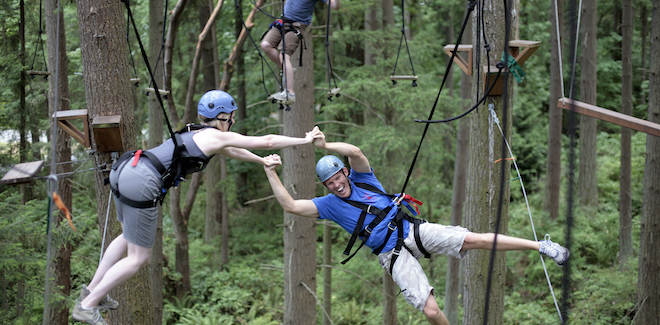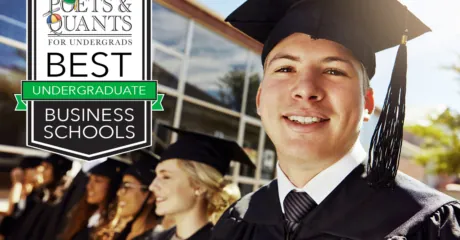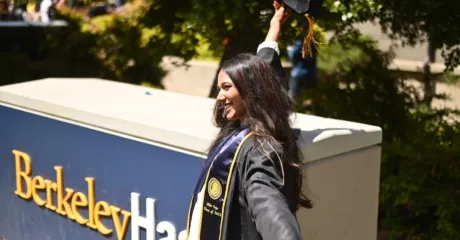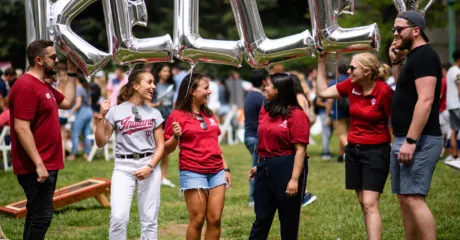Seattle University’s Albers School of Business and Economics secured an excellent No. 67 place in this year’s 2023 rankings – up a solid 7 places from last year’s No. 74 rank. Per the three methodological categories, Albers scored quite evenly across the board, landing at No. 68 in Admissions, No. 66 in Academic Experience, and No. 67 in Career Outcomes.
Albers had an acceptance rate of 84.60% for their most recent incoming class– less selective than last year’s score of 78.20%, and while they did not report an average SAT score for last years incoming class, they did report an average score of 1245 for this year’s class, which helped them move up in the rankings.
Albers performed well once again in career outcomes, with 91.36% of 2023 graduates securing full-time employment within three months of graduation – nearly the same, but up from the past few years’ scores of 90%. Internship rates rebounded as well, with a solid 64% of 2023 graduates securing summer jobs in a business field, up from 52.50% for the Class of 2022.
The Albers undergraduate program is best characterized by its ethics-focused curriculum, real-world learning component, and strong study-abroad opportunities — all of which equip students with a strong and unique outlook on the business world and beyond.
ETHICS-FOCUSED, LIBERAL ARTS CURRICULUM
Seattle’s Albers School of Business offers two Bachelor of Arts degree programs in either Business Administration or Economics. Students in the Business Administration program can choose to major in Accounting, Marketing, Finance, Management, Business Analytics, Business And Law, Business Economics, or International Business.
The core curriculum is a foundational set of 12 liberal arts courses that are distributed over four key learning objectives: “Engaging Academic Inquiry,” “Engaging Jesuit Traditions,” “Engaging the World,” and “Reflection.” The core curriculum encourages students to think critically about their place in the world with a focus on themes such as community and ethics. As a Jesuit university, Seattle University places an important emphasis on the values of ethical and responsible leadership and its core curriculum reflects that. Some core classes include Philosophy of the Human Person, Ethical Reasoning, and Humanities and Global Challenges.
An important distinction of the core curriculum at Seattle is how expansive it is compared to core curricula at other universities. Seattle students typically spend freshman through junior year completing the fundamental courses, as opposed to just two years. In turn, however, Albers students are given a strong foundation in the liberal arts and a comprehensive understanding of important values to lead ethically and responsibly.
REAL-WORLD LEARNING COMPONENT
Many of the business courses at Albers feature a real-world learning component. Surveyed alumni highlighted a variety of key “signature experiences” that were integral to their business learning — from unique capstone projects to case study-based courses.
“I engaged in a thorough business plan review of a local brewery for my capstone project,” one alumni told us. “The coordination efforts and hands-on experience of working with multiple contacts in a successful business helped prepare me well for the communication and coordination skills I needed to quickly become a top associate at my firm.”
“There was one core class that did not have any exam for the whole quarter,” another alumni said. “There were only discussions and presentations for case studies every week. I think it was very unique since I could exchange ideas with my classmates on how to solve problems in the real world.”
What ties the variety of courses together at Albers is the real-world learning component. Projects encourage students to apply their knowledge in real-world situations. Courses emphasize critical thinking and team problem solving over multiple choice exams. In turn, students are given valuable soft skills that can be referenced when it comes time to interview for internships and jobs. Alumni also rated the opportunities given to them at Albers to nurture and improve their soft skills with a strong 8.48 average rating.
STUDY ABROAD OPPORTUNITIES
Albers students have a number of study abroad opportunities. They can choose to participate in either the Study Tour Courses, two-week in-country classes, or the Education Abroad Programs, which are generally longer. Destinations range all over the globe from Madrid and Paris to Beijing and Tokyo.
One of the more popular programs is the two-week Study Tour of the European Union, where students travel to the cities of Madrid, Frankfurt, Paris, Brussels, and Amsterdam. Students explore European business culture and corporate governance and visit a variety of institutions and companies.
“For my international business course, I went on a trip to the EU where we studied corporate governance and met with the big four accounting firms abroad and met with regulatory groups within the EU,” one alumni reported. “This class had a profound impact on my understanding of business principles and being able to see the consecutiveness of our global economy.”
With its strong liberal arts foundation, Albers empowers students to think critically about their place in the world. Its curriculum emphasizes ethical values and critical thinking with a real-world learning component. In turn, students are well-prepared to set out into the world as socially responsible business leaders.
Alumni say:
“Presenting research on a replicable business model of a student-run coffee business at Albers to other universities allowed me to travel abroad on multiple occasions to conduct research. It was by far the highlight of my college career and gave me unparalleled confidence in my abilities as a business leader.”
“I participated in a European Union study tour with two professors and a small group from my university. It was unique as we worked through normal course content that was supplemented by visits to institutions such as the European Central Bank. This trip sparked my curiosity and inspired me to conduct various research projects. It was a defining moment in my education and life.”
“We had a capstone project that required us to use everything we learned in business school and apply it in a real-life case. This was extremely helpful and unique because it showed me how the different fields and tracks of business complement each other to make successful endeavors and projects.”
“Study abroad in Spain at the oldest and most prestigious University in the country. Solid teachers and learning environment that further challenged my learning and pushed me as well.”
“The mentorship program provided by Albers helped me to gain industry knowledge and network in the local Seattle area. The academic advisors provided clear guidelines and resources to make sure that students will succeed in school and the job market.”










